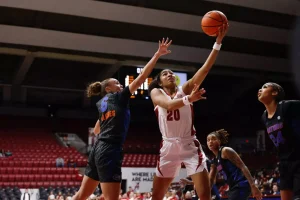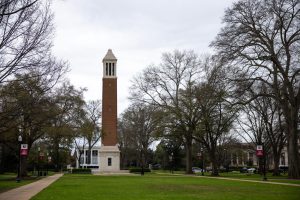Students find unconventional ways to make ends meet
December 4, 2019
College can be expensive for most students. The cost of books and food alone can add up fast, and that doesn’t even take into account any spending money set aside for more enjoyable activities. Many students turn to typical student jobs to try and stay afloat, such as working as a nanny, office assistant or delivery driver. Other students, however, have to get more creative with the way they make their money.
Some students sell their clothes online, others donate plasma, and others have elected to shuttle students around campus on golf carts to make a few dollars. Regardless of the method, the end goal is always the same: to make enough money to support a college lifestyle.
Cara O’Connell, a senior majoring in public relations, has found success selling items from her closet on Curtsy.
“It’s like a high-end, digital thrift store,” O’Connell said. “On Curtsy, I sell clothes that I know I’m not going to wear again, but are in great condition and still in style.”
O’Connell tries to sell at least one article of clothing per week, bringing in anywhere from $10 to $50 in any given week depending on what she sells. In total, O’Connell has earned around $700 selling clothes she won’t wear again on Curtsy.
“It’s not time-consuming,” O’Connell said. “The only thing I have to do is take pictures of the clothes I’m selling, and when someone buys them, I ship them in the mail.”
The issue with Curtsy, however, is that it’s solely based on commission. Students must possess enough in their closet to be able to sell articles of clothing at a consistent rate. The service is a much less sustainable source of income for those who don’t have that same closet capacity.
While O’Connell has accumulated a substantial amount of money over the course of her time on Curtsy, it is still not enough money to rely on. She also works another part-time job as an office assistant at the Ion apartment complex. While necessary to make enough money to be relatively comfortable, she would much rather make selling on Curtsy a full-time job.
“I prefer selling on Curtsy because it doesn’t require me to leave the house or get dressed up for work,” O’Connell said. “It’s easy and a great way to keep my closet uncluttered and up to date. If I wear a dress to a wedding or other event, I know I’m probably not going to wear it again. I’d rather sell it and use the money to buy a new dress for my next event.”
Some students sell clothes; others sell plasma. Aaron Hurd, a senior majoring in biology and math, has made a considerable amount of spending money from donating his own plasma to Talecris Plasma Resources in Tuscaloosa.
“The process was very convenient,” Hurd said. “I went and had my blood tested by them for free. After that cleared, I was ready to donate. You essentially wait 30 to 40 minutes while the machine collects your plasma. It’s super easy, and you can do homework while you’re in there.”
Hurd collected about $100 per week from donating plasma that supplemented the support he received from his parents back home. He never once had any sort of health issue or concern with donating.
“Personally, I had no problem,” said Hurd. “I was told to be wary of the gym, but I honestly felt the same following donation. I did know one of my friends who had some complications, and his arm became very bruised. He was in a sling for a month or two.”
For as much as Hurd enjoyed the money he made from donating, he believed that there are better options for students looking for a reliable source of income.
“It’s much less intimidating to start donating plasma than getting a job, but I think a part-time job is much more sustainable,” said Hurd. “It’s weird to sell your body as a solid source of income.”
A part-time job on campus that is more sustainable is driving students around campus wherever they need to go. Sophia Triche, a junior majoring in fashion merchandising, has the freedom to decide how much she makes in a night when she drives golf carts around campus for Kwik Kart.
Not only is the ability to make money uncapped, but Triche says one of the best parts of the job is the riders she encounters during a shift.
“It’s always a different crowd,” said Triche. “Game day has always been the most interesting people I have met, but I’ve learned a lot about Tuscaloosa and the campus in general from the stories people tell.”
Triche makes half of every ride she completes, plus tips. The money isn’t always consistent, however, as it often depends on circumstances out of her control.
“It’s all super variable,” said Triche. “It depends on everything from the weather, to how many people are in town, to what is going on around campus that night.”
Triche feels that the job feels less like work and more like a time to hang out with friends and meet interesting people.
“The job really is what you make of it,” Triche said. “I really like the people I work for and that I work with. It is a big family sort of feeling with everyone.”










